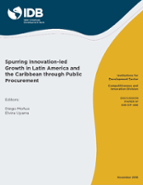Spurring Innovation-led Growth in Latin America and the Caribbean through Public Procurement
Date
Nov 2016
EDITOR
Moñux, Diego;Uyarra, Elvira
Public procurement accounts for a significant proportion of overall demand for goods and services. Thus, it could be a useful tool for fostering innovation and economic growth. While interest in the use of public procurement as industrial policy is not new, its potential to spur demand for innovative products and services, create incentives for business innovation, and accelerate the diffusion of new technologies has received much policy attention in recent years. The aim of this study is to advance knowledge on the role of public procurement as a demand-side policy instrument in stimulating firm innovation in Latin American and Caribbean (LAC) countries. In LAC countries, public procurement systems account for 20 percent of GDP, which suggests a considerable untapped potential to use public procurement for innovation (PPI) to strengthen their economic position and improve public service provision. The report first reviews the evidence on the implementation and impact of instruments and structures introduced to support PPI in selected developed countries (the United States, the European Union, Estonia, Netherlands, Spain, the United Kingdom, China, and the supranational case of EU procurement policy), identifying useful policy lessons for LAC countries. It then focuses on emerging innovation friendly procurement practices introduced in three selected LAC countries: Brazil, Chile, and Colombia. These countries offer a diverse picture in terms of the institutional path they have followed for the development of public policy for innovation/pre-commercial procurement (PPI-PCP) policies as well as important differences in the level of development of their innovation systems.




